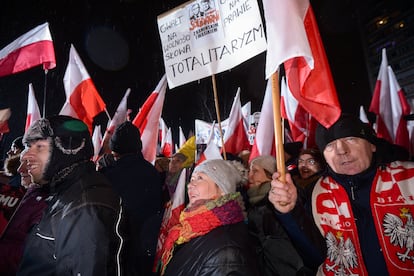Poland’s president plans to pardon two politicians as tens of thousands hold anti-government protest
The demonstration was against the arrests Tuesday of the two senior party members who served in the previous conservative government

Poland’s president said Thursday he has started the process to once again pardon two politicians who were arrested earlier this week amid a bitter standoff between the new centrist government and the previous conservative administration.
The development came as tens of thousands of people with anti-government banners and Polish white-and-red flags gathered for a protest in front of the parliament building in Warsaw, which later developed into a peaceful march to the office of Prime Minister Donald Tusk.
The demonstration was organized by the former governing party, Law and Justice, which held power for eight years until last month and is closely aligned with President Andrzej Duda.
Law and Justice leader and lawmaker Jarosław Kaczyński, who was Poland’s most powerful politician during the party’s term in power, used his usual rhetoric to speak against Tusk’s new pro-European Union government.
“We must stop this power and, at the right moment (and) using the election ballot, change it in a way that will prevent it from ever coming back again, because it is not a proper Polish power,” Kaczyński said. “Polish power should defend Polish interests.”
Law and Justice, frustrated over its defeat in October parliamentary elections, urged its supporters to protest moves by the new government to take control of state media.
The protest was also against the arrests Tuesday of the two senior party members who served in the Law and Justice government, former Interior Minister Mariusz Kamiński and his former deputy, Maciej Wąsik. They were also stripped of their parliamentary mandates and immunity.
Kamiński and Wąsik were convicted of abuse of power for actions taken in 2007, when they served in an earlier Law and Justice-led government. Duda pardoned them in 2015, though legal experts argued the pardons weren’t legal because presidential pardons are reserved for cases that have gone through all appeals, which wasn’t the case then. Critics point to these contested pardons as an example of Duda disregarding Poland’s law and acting in the interest of Law and Justice.
In June, Poland’s Supreme Court overturned the pardons and ordered a retrial. Kamiński and Wąsik were convicted again and sentenced in December to two years in prison. Police on Tuesday arrested them while they were at Duda’s presidential palace, where they were apparently hoping for protection.
Duda long maintained that his 2015 pardons were legal, but on Thursday he said he was initiating clemency proceedings for the two men at the request of their wives. This time, Duda appealed to the justice minister, who is also the prosecutor general, to approve their pardons and to release the two men from prison while the decision is being made. He stressed he wanted everything to be done strictly according to Poland’s constitution and other laws.
His announcement came shortly before the protest organized by Law and Justice, which had governed since 2015 before losing the election. Now in the opposition, the party called for a protest by “Free Poles” in defense of democracy and free media, although during its time in power, Poland’s international media freedom ranking fell significantly.
Earlier on Thursday, a contentious chamber of the Supreme Court, still controlled by Law and Justice, ruled that the October election was valid. The election had a record nationwide turnout of more than 74% and gave power to a coalition of parties opposed to Law and Justice.
Tusk’s government is set on reversing some policies of its populist predecessor, including ones that brought conflict with the EU, such as changes that put Poland’s justice system under political control.
In one of its first steps, Tusk’s government moved to take control of state television, radio and news agency PAP, which Law and Justice turned into tools of aggressive propaganda against its critics and against Tusk personally.
Leaders of the former government maintain that Tusk’s moves were illegal and have staged occupations of the media premises. Commentators say Law and Justice wants to keep control of the nationwide broadcasters before local administration elections this spring.
The Helsinki Foundation for Human Rights in Warsaw said the manner in which the new government has taken control of state media “raises serious legal doubts,” but many law experts say Law and Justice has complicated regulations to such an extent that bold steps are needed to untangle them.
Sign up for our weekly newsletter to get more English-language news coverage from EL PAÍS USA Edition
Tu suscripción se está usando en otro dispositivo
¿Quieres añadir otro usuario a tu suscripción?
Si continúas leyendo en este dispositivo, no se podrá leer en el otro.
FlechaTu suscripción se está usando en otro dispositivo y solo puedes acceder a EL PAÍS desde un dispositivo a la vez.
Si quieres compartir tu cuenta, cambia tu suscripción a la modalidad Premium, así podrás añadir otro usuario. Cada uno accederá con su propia cuenta de email, lo que os permitirá personalizar vuestra experiencia en EL PAÍS.
¿Tienes una suscripción de empresa? Accede aquí para contratar más cuentas.
En el caso de no saber quién está usando tu cuenta, te recomendamos cambiar tu contraseña aquí.
Si decides continuar compartiendo tu cuenta, este mensaje se mostrará en tu dispositivo y en el de la otra persona que está usando tu cuenta de forma indefinida, afectando a tu experiencia de lectura. Puedes consultar aquí los términos y condiciones de la suscripción digital.








































